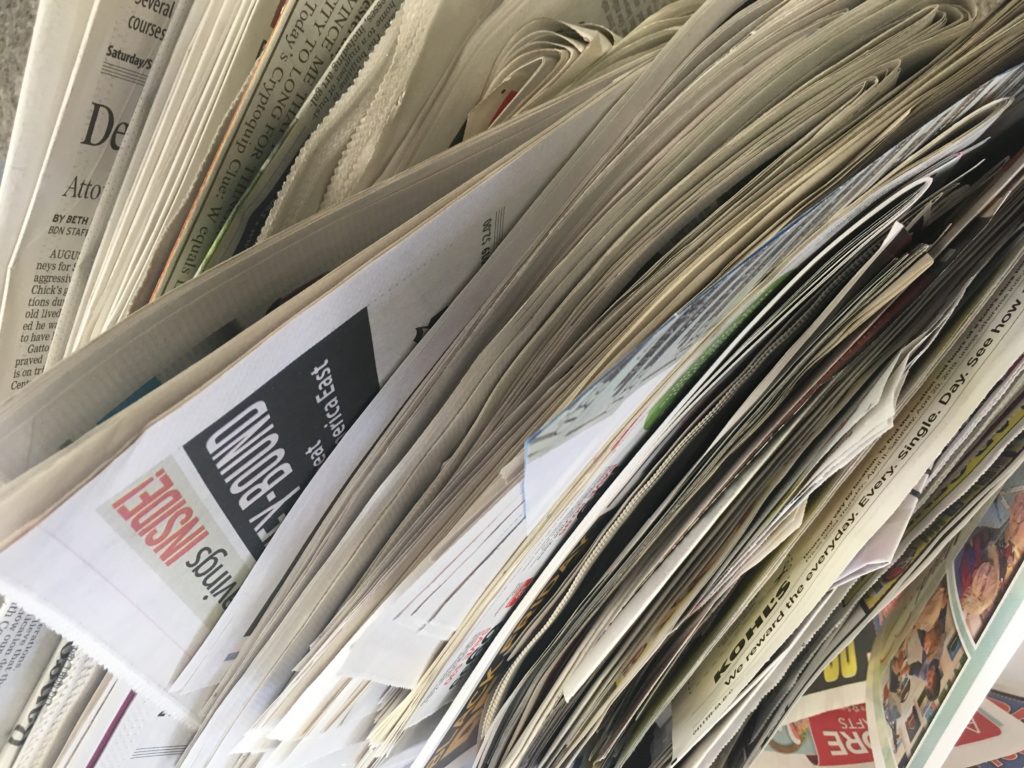10 ways to upcycle newspapers
Newspapers stacking up? Here’s how to upcycle newspapers, giving them really useful second lives.

If you are a daily print reader, you may have accumulated a fair number of old newspaper that have been sitting in your house for days (or weeks … or even months).
You may be in the habit of recycling your newspapers, which is pretty positive when it comes to sustainability. Newspaper recycling has been one of the recycling movement’s biggest successes. According to the U.S. Environmental Protection Agency, about 70 percent of all newspapers in the United States are recovered and recycled. About a third of the recycled fiber from newsprint is used to create paper for newspapers according to the Newspaper Association of America.
Though you may be enjoying the eco-friendly ego-boost that comes from recycling newspapers, you are also wasting a valuable resource, especially for gardeners, farmers and homesteaders. Because of its structural-yet-pulpy quality and ubiquity among print subscribers, newspapers are one of the handiest materials to upcycle around the house.
Here are 10 ways to upcycle old newspapers that are worth renewing your subscription for.
Glass cleaners
Here’s a great natural spring cleaning hack: the abrasive ink on newspapers helps cut grease on windows without leaving streaks. A little bit of vinegar mixed with water (a 1 to 5 ratio of vinegar to water is ideal), which you can either spritz onto the window with a spray bottle or dip the paper into, will really make your windows shine. Be sure to clean on a cloudy day, too, as sunshine will cause your windows to dry too quickly and leave streaks. You can also use newspapers to clean mirrors for a streak-free shine.
Seedling pots
Reduce the use of plastic in your garden and save money on gardening supplies by making your seedling pots out of old newspapers. Cut a sheet of newspaper in half along the fold, fold it in half, roll it around a cup or can, fold and tape the bottom and side and voila — you have an easy, cheap seedling pot that is easy to remove or will decompose if directly planted in the ground.
Weed barrier
Newspapers are an effective barrier to weeds. Cover your beds or plots with newspaper, thoroughly soak them with water and cover the paper with compost or mulch. Eventually the paper will smother and kill the weeds. Plus, the cotton fibers in newspaper amends the soil, leaving it soft and loose and adding organic matter that will help your garden flourish.
Compost
Newspaper is one of those materials that maybe you did not know you could compost. Add moderate amounts of wet, shredded newspaper to your compost heap for added organic matter, but first be sure the newspaper you are using has non-toxic ink.
Pest deterrent
Wet newspaper is an irresistible hiding place for many nocturnal pests like slugs, pill bugs and earwigs. Use a section of damp newspaper around infested areas overnight to attract the problematic bugs as eco-friendly bug traps in place of pesticides. In the morning, scrunch the papers up, bugs and all, and dispose.
Ripen or extend the life of your produce
Getting produce to that just-right stage of ripeness to eat can be challenging. Newspaper can help. Wrapping apples in old newspaper somewhere dry will keep them from rotting, which will ensure that you have tasty apples and help you save money on groceries. On the flip side, you can wrap green tomatoes in sheets of old newsprint, layer them in a box with a lid and they will quickly ripen. You can also use newspaper to line your fruit and vegetable drawers to absorb odors and mess from rotten produce.
Cat litter box and pet cage liner

Cat urine will likely soak through to the bottom of the litter box even if you use the best clumping cat litter around. Line your kitty’s litter box with a thick pad of newspaper for easy cleaning and to absorb odors. You can also line rabbit cages with newspaper to help simplify cleaning and manage the smell.
Vermicompost bedding
Shredded newspaper makes an ideal bedding for vermicompost, or worm compost. Gardeners should run the paper through a paper shredder, wet until the newspaper is slightly damp and add it to the bottom of your vermicompost bin. The worms will feed on the newspaper along with the food scraps, so be sure to regularly refresh it.
Store perennial bulbs
Perennial bulbs need to be stored in a breathable, dry material over the winter so that they do not rot. You can pack your bulbs in a cool, dry location, either in a cardboard box with newspaper in between each layer, or your can wrap the bulbs themselves in used newspaper.
Keep garden tools clean
Save money on gardening supplies by extending the life of your favorite garden tools. Wiping the working ends of your tools with a few sheets of newspaper will remove dirt and debris. After wiping your tools down, plunge them into a bucket filled with sand mixed with a cup of oil (motor oil and mineral oil work best, but linseed oil is an eco-friendly alternative). Over time, this will prevent rust from taking over your tools.
